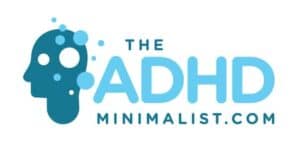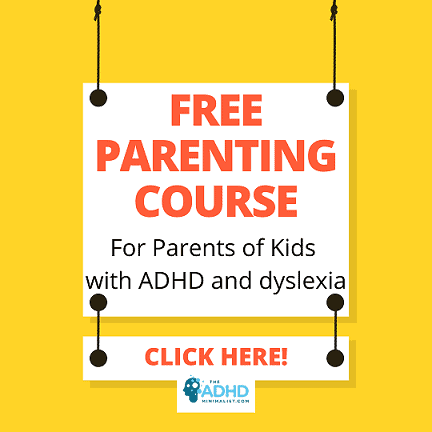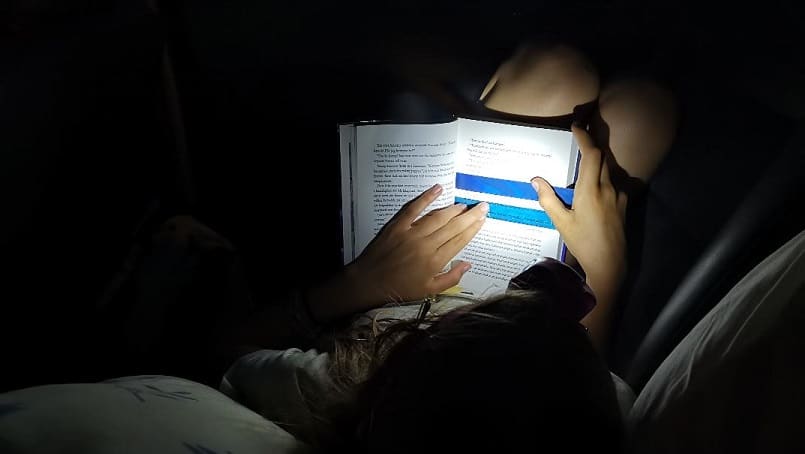
Imagine you’re sitting in a car driving by a billboard plastered with a city where your cousins live. You open your mouth to tell your mom you want to visit again, but the name of the town is gone!
”Mom, I’d love to visit. . . That place. . . hmmm. . . the city we visited that one time. . . when I fell down sledding. . . We visited relatives. . . They owned a dog. . . Do you remember? It’s on the tip of my tongue, but I can’t get it out!”
This is a ‘Normal’ experience for my 12-year-old daughter who struggles with extreme dyslexia. Words randomly disappear as she talks.
Problems with word retrieval or word-finding can manifest in different ways, suddenly being at a loss for words, trouble remembering how a word sounds, or saying a similar but wrong word are a few issues dyslexic people struggle with. These stumbling blocks are some of the most common signs of dyslexia, and they aren’t isolated to the spoken word. Writing can present similar problems.
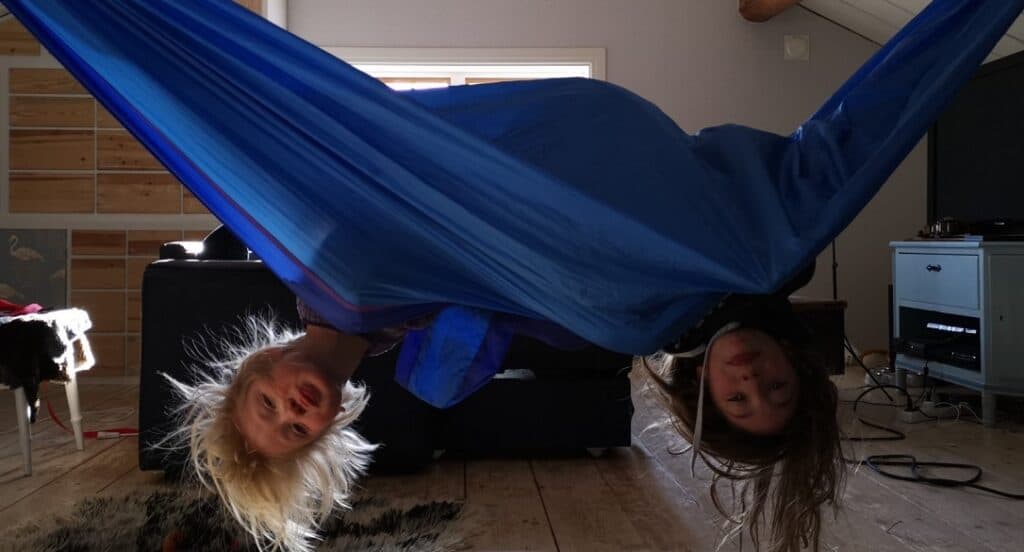
How Dyslexia Affects Social Skills
Kids who struggle with word retrieval are often behind in reading and writing, but most people don’t automatically associate falling behind socially or social ostracization with dyslexia.
Dyslexia and Hanging Out With Peers
Imagine your standing with a group of friends and having a rapid conversation. Suddenly you inject with, ”The other day my brother did something really funny! We were at McDonald’s and he. . . he. . . um. . .whats the word?. . ” Your friends probably don’t have the attention span or the patience to wait for you to find the right word. By the time you think of what you want to say the conversation moved on and your story is no longer relevant.
This can happen to the best of us, but if it happened nearly every time you tried to tell a story or answer a question in school it wouldn’t be funny.
Dyslexia and Communicating in Writing
Writing assignments can present their own problems. Besides flipping letters around kids with dyslexia take more time to write and may use simple words with general meanings to replace specific words they forgot.
Trying to send an SMS to a friend can be a frustrating experience, and children who haven’t learned to laugh at their mistakes may be deeply hurt when their funny writing mistakes circulate around the school.
Dyxlexia and Stress
Fear of being laughed at and fear of failure can increase stress. Stress causes those with dyslexia to forget more words and make more mistakes. If it’s possible to establish over time that their class at school, youth group, or sports team is a safe place this helps to diminish stress and thus decrease unnecessary mistakes.
If on the other hand, these social constructions are obviously not safe the child may be picked on or the brunt of jokes. Sometimes kids can be ruthlessly cruel. Quitting a sport or the girl scouts is one thing, but when bad experiences at school are the issue teachers and parents need to step in and help.
Dyslexia and Being Misunderstood by Teachers
Teachers need to be aware of practices that embarrass children. Children who are constantly embarrassed by teachers feel they want to crawl in a hole and hide or be disrespectful. The teacher may be completely unaware they are embarrassing a child or part of the problem.
Some kids are outright disrespectful, and others may only daydream about what they would like to say and do to a particular teacher. Either way, if the child already feels labeled subpar by their teacher they may feel making decent friends is hopeless and quit trying.
Being humiliated takes loads of emotional energy whether it’s from a teacher or a peer. It also dictates the behavior of the humiliated child. Fight or flight instincts kick in. Some kids have it out right then and there while other kids run and hide. The school bathroom is a common refuge for kids who release pent-up emotions in tears.
Spending all this emotional energy exhausts the child causing them to make more mistakes, and it’s nearly impossible to make positive connections with peers when in this state unless the child already has a best friend with a shoulder to cry on.
Planning silent revenge is distracting, takes time and energy, and isolates children from their peers. I should know I was one of those kids.
Humiliating examples from my own life.
History class
In the fourth grade, my teacher often asked the class to read a chapter in one of our textbooks. When we were done reading she had something fun for us. I watched as all the fast readers speed through the chapter and ran off to have fun. I was always left plundering through the chapter reading even slower when distracted by the fun at the back of the room.
These mandatory reading times were torture. A boy and girl also slow readers were usually by my side saving me from total humiliation. I hadn’t yet learned to cheat. I never cheated by looking at others’ answers or sticking a paper up my sleeve, but I learned to pretend I’d read what the teacher required. If I needed to understand something I read it at home.
If you teach try setting a time for reading, when the time is up let the class know they can read the rest at home if they didn’t finish. If you have a fun activity planned let the whole class start at the same time. Kids with dyslexia can’t help it if they’re slow readers. Showing dyslexic kids how much slower they are compared to their peers sucks the last sliver of joy out of reading.
Math Class
A few years later I decided it was time for me to start paying attention in math class. I never liked math. I spent most lectures daydreaming, and consequently, I had to ask for help after school to catch up. On this particular day, I decided to do my best to pay attention in math class. I wanted to see if listening would help me get my homework done faster.
I fixed my eyes on the teacher and tried my best to understand her explanations. Suddenly she looked me in the eyes and demanded to know why I was not reading along in my math book! I was so completely taken aback I didn’t think of anything coherent to say. All my words were gone, panic set in and only one phrase raced through my head was, ”I didn’t do anything wrong, I was paying attention!”
I stammered something about listening, all the while feeling 40 eyes boring into my back! My humiliation wasn’t over. Apparently, my lack of eloquence made me look more suspicious than ever. The teacher’s dark eyes swept me up and down. What are you hiding in your lap? You seem to be playing with something instead of reading. I placed my hands on the desk. There was nothing to see except raw cuticles from constant picking. Fiddling was the one thing that channeled my energy and kept me in my seat.
After the class was over I realized I should’ve explained that I had reading difficulties and it was more distracting than it was helpful to follow along in my book. I learned better by listening and remembering, but I never explained myself. I decided to spite my teacher by never paying attention in her class again. Unfortunately the only person this hurt was me.
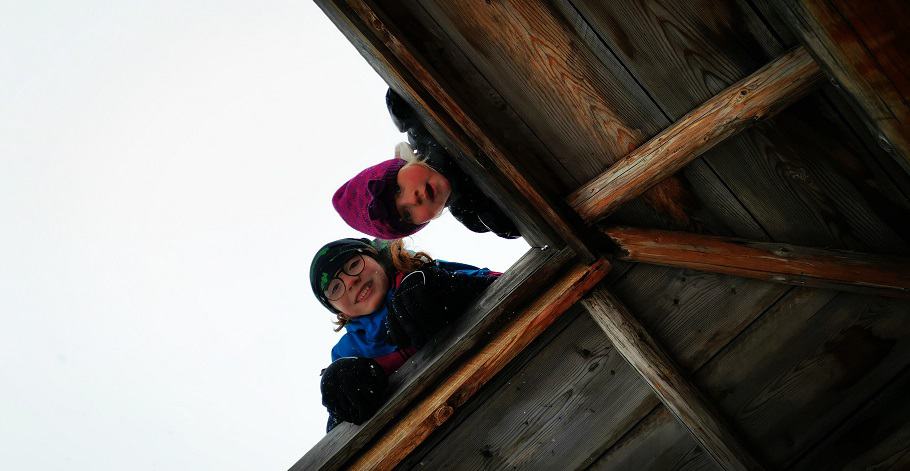
How Children Respond to Their Social Difficulities
These responses are gleaned from years of observing my son and daughter and their struggles with dyslexia, interviews, and my own responses to dyslexia.
Those who screened me as a child didn’t think my dyslexia was bad enough to warrant help. I went on to chronically misspell words, flip letters and numbers around, forget words, and feel that I was not as smart as my classmates. This feeling of inadequacy drove me to prove everyone wrong. I became adept at asking for help and eventually graduated as a straight-A student.
Not everyone responds to learning difficulties the same way. Some kids feel they don’t measure up in academics and take on a persona like the class clown or the teacher’s pet. They may strive to excel at sports or extra circular activities to make up for low grades, or they may give up altogether and quit trying.
Going with or against the flow
Sometimes kids chose to go with the flow and sometimes they get sick of never getting a word in edgewise.
When my daughter was younger (first and second grade) she had days when she was extremely hard to get along with. She got fed up with never being listened to by friends. She wanted to be the one who decided for once and she refused to compromise. On days like these, I was completely exhausted by the time her friend went home. I spent most of the playdate smoothing over problems and trying to negotiate compromises.
Tears
Other days she felt completely tongue-tied and burst into tears repeatedly. I think her crying days were when her dyslexia was at its worst. On emotional days she cried at inopportune times and teachers and friends didn’t understand what was wrong.
Teachers often tried to get to the root of the problem, but that’s hard when nothing ‘HAPPENED’ to cause tears. She couldn’t explain what was wrong, and friends seemed to think she was weird.
Patience or impatience
Kids with dyslexia usually have the patience to explain what they are trying to say despite missing words. This takes time. Grown-ups (hopefully) have the patience to listen to kids clarify what the missing words are. This usually involves explaining what happened in particular places or describing attributes of items or people they forgot the names of. While grown-ups guess words until the child excitedly shouts, ”That’s it!”
They know what they want to say, but their communication tools suddenly went up in smoke. Think of it like stage fright. You’re on-stage performing Romeo and Juliet when you look at the audience. The staggering number of people watching you makes you nervous and tongue-tied. Suddenly the lines you practiced hundreds of times disappear! For kids with dyslexia and word retrieval problems, the stress and forgetfulness of stage fright happens in everyday life.
Choosing to be alone
When kids find social experiences frustrating they may choose to spend most of their time alone.
Excape
There have never been so many means of escape at our fingertips as in society today!
Most kids have a smartphone. It’s easier than ever for them to create their own bubble where they obsess over a TV series or disappear into an online game. When I was a kid I escaped into my bubble from time to time, but I didn’t have a smartphone I used my imagination. I was a daydreamer.
The Best Friends Trap
A child may have a best friend. In some ways, this feels safe. Kids automatically know who they want to be with when they have free time, but the ‘Best Friend’ can also be a trap.
I’ve seen friendships come and go, and those who only invest time in one friend set themselves up for loneliness when that friendship ends.
When your child is in the middle of a really great friendship you think it will last forever. Unfortunately, friends from grade school and middle school rarely stand the test of time. Kids grow like weeds during these years. They develop physically, emotionally, and mentally, and their hormones start wreaking havoc. They change and friends change.
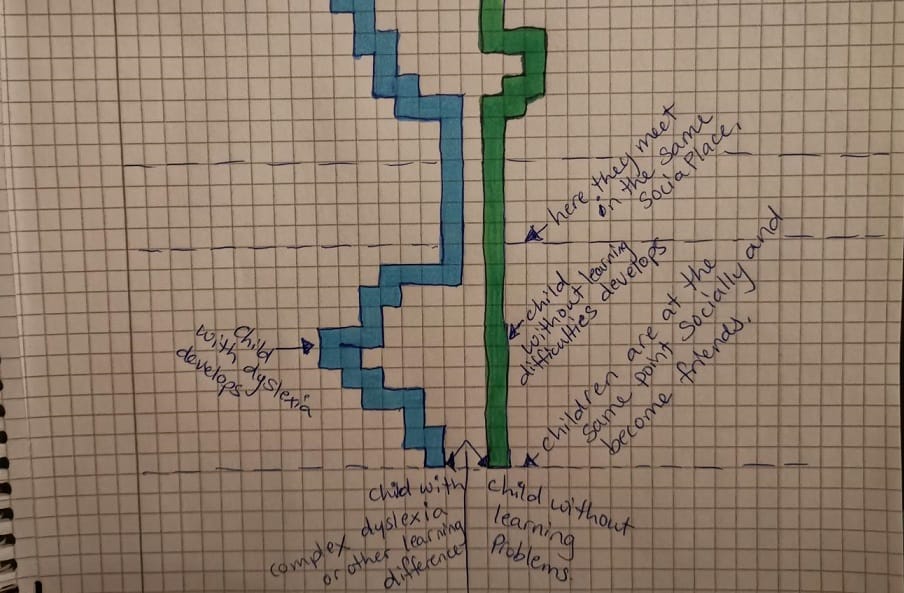
Kids with learning differences (disabilities) add another complicated layer to this complex picture. They may be on the same page with a best friend one year only to realize that their friend grew and matured during the summer while they didn’t. You could say their friend outgrew them. Kids with learning differences may lag behind during periods of learning or development. Often they catch up later, but it’s hard to be on the same page with a best friend through all these ups and downs. It’s best to have several friends.
Clinginess
If a child finds the social intricacies at school scary they may find a friend they would like to have as a best friend and cling to them like a vice. This predetermined ‘Best Friend’ may or may not want this role.
What the dyslexic child is after is someone to guide them through social situations when they don’t know what is expected of them. Someone to ask questions of when they don’t understand a fast-paced conversation and a friend to listen when they try to explain words that they forgot.
If the new ‘Friend’ doesn’t want a tag-a-long the child may be embarrassed or hurt.
Choosing Activities Instead of Friends
When kids find hanging out with several friends during a school break frustrating they may choose what they want to do during break and let the activity determine which classmates they hang out with.
There is nothing wrong with this. The child will probably be with a variety of kids from different classes and these schoolmates will change from recess to recess. The one thing to think about is that they will most likely not be going deep in these friendships. While peers from their class may hang in the same group every deepening their friendships your child is working on basketball, soccer, or ping-pong skills and general niceties.

How to Help
Cultivate Friendships
Parents can help. Children who have trouble reading social cues or who can’t keep up with a rapid conversation need to spend time strengthening the bonds of friendship one on one.
Invite Friends over to your house one at a time. Be available to sort out disagreements, and suggest activities if necessary.
Lend a Listening ear
Make sure you have a positive relationship with your child, and you give your child a chance to share about their day at school. Keep your ears open. Maybe you need to invite a particular friend over, talk to a teacher, or give encouragement.
Talk to the Teacher or Principle
If you notice your son/daughter is having a hard time in a particular class make sure the teacher knows the difficulties your child has and how they can help.
If your child expresses extreme frustration or resistance to being in a particular class (They may be skipping class or in a bad mood when a particular teacher’s class rolls around every week) try to get to the bottom of the problem.
Don’t accuse a teacher of publically humiliating your child if you aren’t 100% sure! I gave examples from my own life. In the first instance, the teacher had no idea how embarrassed I was by her teaching methods, so tread lightly. You want the teacher to be on your side helping your child, not in a tug-of-war with you.
In the second instance, it’s not uncommon for teachers to pause a lecture and ask unruly students to settle down, so the class can concentrate. In this case, I wasn’t disturbing anyone except the teacher. I wasn’t following along in my book as she asked, and my teacher needed to understand why. Teachers are not mindreaders. If it’s too difficult for your child to explain how they learn to a teacher then you (mom or dad) need to do it for them.
If you are making zero headway talking to the teacher then it may be time to take it over their head and call the principal. Again tread lightly you want the school on your side.
Practicing Decision Making and Compromising
If you notice your child is having a hard time compromising on what to do with friends it may be time to practice making decisions and compromising with mom or dad. Let your child make at least one decision every day. It may be what snack to take to school, what game to play, or who to invite over what they’re making a decision about doesn’t really matter. It’s easier for your child, especially in the beginning, to choose between two options. ”Do you want to have apple slices or a sandwich for a snack?”
To practice compromising it’s best to keep your ears open. When your child wants Cheetos for after school snack this may be a good time to say, ”Cheetos aren’t good for you. You may choose oranges or fruit rollups for snack.” Then stick to your guns!
Talk about emotions
You can’t expect your child to communicate how they’re feeling if they don’t know the words for different emotions. If your child isn’t highly verbal make an emoji chart with faces and the name of the emotion under, then let your child point.
Most of the time we are happy, sad, angry, scared, unsure, or frustrated. Putting words to emotions helps all children, but it can be especially helpful for children who burst into tears several times a day.
Have Patience and Share Your Knowledge.
It can be helpful to explain to your child’s friends’ parents about the language difficulties your child is having. Let them know that if your son/daughter is at their house and completely forgets a word the best thing they can do is to have patience and help find the missing word.
Let the parents explain dyslexia to their children unless your child wants you to come to school and talk to their class about dyslexia and how classmates can help when they forget words.
Some kids find this extremely helpful and other kids feel the very idea of mom or dad explaining their difficulties makes them want to die of embarrassment.
Talking to other parents behind your child’s back can work with small children, but make sure you talk to your preteen/teen before you go blabbing to people they know.

Loneliness and digital escapes
If your child often chooses to be alone you may need to gently push him/her to spend some time being social. Video games and online friends are poor substitutes for friends in your neighborhood.
I find that when my daughter needs to be social she appreciates knowing what she is going to do ahead of time. If I say, ”Tammy needs somewhere to go after school tomorrow. I told her mother she could come over and hang out.” This statement causes my daughter to see red flags. If I instead say, ”Tammy needed somewhere to go after school. She is coming over tomorrow, and you can make gingerbread houses or go swimming.” Then my daughter knows they have something concrete to do which helps avoid social awkwardness.
Yes, you the parent may need to invest time driving your child and friends to the pool or other activities, but that’s a small price to pay if your son/daughter has fun socially and puts their smartphone away.
Break the Best Friend Bubble
If your child is only with one friend make a point to invite several kids over at a time or make a compromise that the ‘Best Friend’ can come over every other time you invite friends over. The point is not to break up this friendship it’s to introduce new friends.
If your child feels he/she knows several kids relatively well they won’t be quite as heartbroken if a special friendship ends. Again this may require driving to special activities and you may need to do activities with new friends and without the ‘Best Friend.’ Try to be tactful and not make anyone feel left out.
Clinginess and choosing activities over friends
Honestly, the answer to these problems is basically the same as the advice I gave for breaking the best friend bubble. If your child feels comfortable with several children he/she won’t be as clingy.
If your child is never with the same children at recess (ask their teacher) then make a point to cultivate friendships outside of school. Often this means your family needs to do the inviting.
Unfortunately, kids with learning disabilities make nice wallflowers. They may be standing with a group of friends every day, but if they don’t say much it’s like everyone forgets they’re even there. They often get overlooked when kids send birthday party invitations. This can hurt mom and dad almost as much as the overlooked child.
It’s your responsibility as a parent to invite friends over and plan fun activities to make up for this deficit.
If you found this helpful check out my other posts on Dyslexia!
Copyright Annie Eklöv
